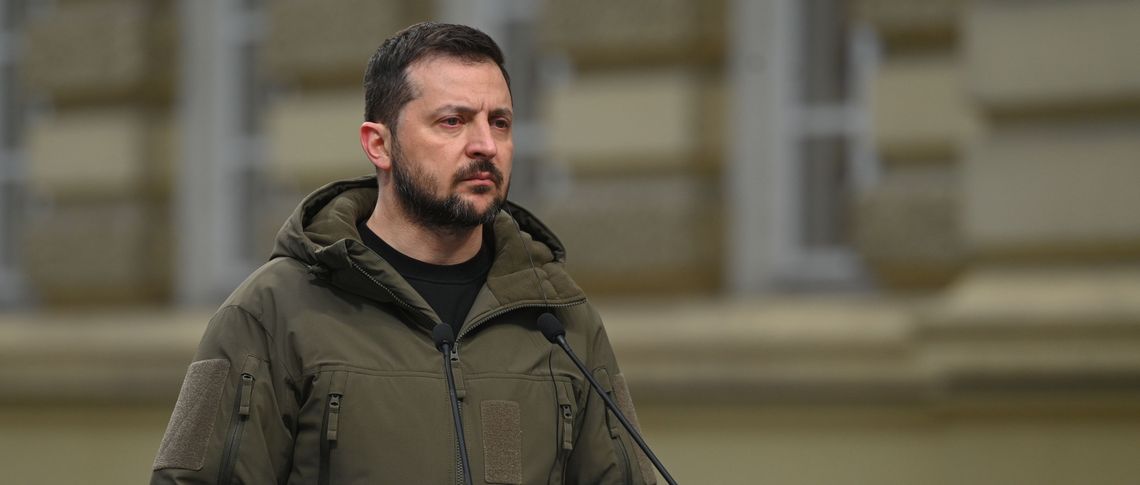On Ukrainian Independence Day among the foreign guests in Kyiv was Republican Senator Lindsey Graham, for whom this was not the first visit to the country since Russia's large-scale invasion. Graham is one of the American politicians who have consistently supported Ukraine, demanding even greater military support for it from the White House. Kyiv returned the compliment. The senator is one of the few foreign politicians who can count on 'in-depth’ briefings on the combat situation and the progress of Ukrainian troops.
On Independence Day, Graham said at a press conference that Ukraine ought to hold elections. Whether it was his message, that of the American authorities, or perhaps even the Ukrainian authorities wanting to legitimise their own desires through an American politician, in any case, the opinion of an individual senator launched a discussion in Ukraine on the subject of elections. And the way President Volodymyr Zelenskyy reacted suggests that elections could actually take place.
According to the law, parliamentary elections ought to be held in Ukraine in 2023 (29 October) and presidential elections in 2024 (first round – 31 March, second (in the event of a second round being called) – 21 April). But one can affirmatively say that the mandate of the current parliament will be continued: elections have not been announced, funds have not been provided for them, the election campaign is not underway, and the Central Election Commission does not display even a hint that it is preparing for them.
Zelenskyy is at the peak of his popularity
Almost no one is insisting on these elections. The war has brought political activity in the country to a virtual standstill. There are bans on mass protests. Freedom of speech is going through hard times — the state is limiting access to television channels deemed to be opposed to the government. The parliament operates behind closed doors, and the public learns about its decisions after the fact, giving society no opportunity to influence its elected representatives. Holding party offices and campaigning at a time when the economy is failing and the state is largely dependent on funding from Western partners are the height of arrogance and cynicism. For this reason, no new parties are being founded, non-parliamentary forces lack both the opportunity and the will to work, while parliamentary forces are interested in continuing their term.
Another thing is the presidential election. From a legal point of view, there is no essential need to hold elections for the head of state now or next spring. Article 11 of the law ‘on the legal regime of martial law’ provides that ‘in the event of the expiration of the term of office of the President of Ukraine during martial law, his powers continue until the newly elected President of Ukraine, elected after the lifting of martial law, takes office’. The legislators gave the opportunity to a president waging a war to carry it through to the end, without being distracted by matters other than achieving victory. But while all this is true, there is also a political reality.
Today the majority of Ukrainians trust most, among the institutions, the Armed Forces of Ukraine and, among politicians, President Zelenskyy.
In Ukraine, since the beginning of the war, sociological campaigns have stopped measuring presidential ratings. Instead, what is measured is the level of trust, which, if desired, can be regarded as the level of electoral support. According to the July poll of the sociological service of the Razumkov Centre, today, the majority of Ukrainians (93 per cent and 81 per cent, respectively) trust most, among the institutions, the Armed Forces of Ukraine and, among politicians, President Zelenskyy. Furthermore, among relevant political personalities, no one seems to have presidential potential: the head of the Mykolaiv Regional State Administration Vitaliy Kim (71 per cent), volunteer Serhiy Prytula (55 per cent), adviser to the head of the Office of the President Mykhailo Podoliak (52 per cent), Secretary of the National Security and Defence Council of Ukraine Alexey Danilov (52 per cent).
Among those whom Ukrainians trust the least, there are a number of people who previously fought for the position of president and even held it. The majority of respondents do not trust the leader of the Batkivshchyna [Motherland] party Yulia Tymoshenko (78 per cent), the leader of the parliamentary group Platform for Life and Peace Yuriy Boyko (76 per cent), and the fifth President of Ukraine Petro Poroshenko (71 per cent).
Therefore, from a mathematical electoral point of view, now is the ideal moment for Zelenskyy’s re-election – at the peak of his popularity. This cannot necessarily be ensured in the future. In what way will the war end? Can the president be confident that his level of support will be equally high after the war? How will competitors be perceived when they begin to find and openly talk about possible miscalculations by the current president before and during the Russian invasion? Theoretical answers to these questions paint the pre-election situation for the president as worse than it currently is.
The war ‘nullified’ all political promises
Perhaps this is a premature assumption, but it seems that Zelenskyy has already begun to implement the scenario of his re-election. Of course, the president of a warring country, the supreme commander-in-chief, cannot be guided in public by political expediency. He talks about other motives. ‘In 2024, if the war continues, if elections are held, I will never in my life abandon my country. Because I am the guarantor of the Constitution, and I defend it in any case’, stated the President in an interview with Portuguese public television channel RTP. When asked more specifically if he was afraid of losing, Zelenskyy replied: ‘I’m not afraid of anything’.
Only this motive – to be close to one’s people in difficult times – will prevent the current president’s competitors from using his own election programme with which he went to the polls in 2019. Specifically, these words: ‘I want to assure you right away that I am running for one term to change the system for the sake of the future.’
The war ‘nullified’ all previous political promises. This is a new reality. On the one hand, there is a desire to demonstrate that the state is alive. Holding elections confirms this, and the current president’s participation in them is a noble act of a statesman who exists in the ‘the people are us’ paradigm. On the other hand, the range of problems that the country will face during their implementation (not obligatory by law) may lead to the idea that people are using the complete paralysis of the political system to extend their powers.
The Ukrainian military should not only have the opportunity to vote in elections, but also take part in them as candidates.
In Ukraine, there is not a single process that is not affected by the war and that would function as it did before 24 February 2022. The first problem of holding elections, and Zelensky points to this in particular, is security. One can only imagine how Russia would become more active and how many more missiles of various types would be launched into Ukraine when an election date is published.
In addition, according to the Ukrainian Ministry of Foreign Affairs, as of 21 June 2023, 8.2 million Ukrainians are abroad. This is 20 per cent of the population recorded up to 24 February 2022. In addition, according to estimates by the Ministry of Social Policy, the number of internally displaced persons amounts to about 4.7 million people. And all of them, with the exception of children, have the right to vote. But how to make this possible is still unclear.
‘We need every vote... We need a legitimate election... We need the military to also be able to vote. They are defending this democracy today, and not giving them this opportunity because of the war is dishonest. I was against the elections only because of this,’ said Zelenskyy in another interview.
And here another emphasis is important: the Ukrainian military should not only have the opportunity to vote in elections, but also take part in them as candidates. Today, there is no such possibility, and there are no legislative initiatives that would provide for the participation of the military both in hostilities and in the electoral process at the same time.
The estimated pre-election expenses of the state budget for the next year are as follows: for holding the presidential elections in Ukraine – UAH 5,418.3 million; for holding elections of people's deputies – UAH 3,745.8 million.
Another issue is money. Zelenskyy is counting on the West to pay for the elections. According to data that the Ukrainian Ministry of Finance received from the Central Election Commission, the estimated pre-election expenses of the state budget for the next year are as follows: for holding the presidential elections in Ukraine – 5,418.3 million Ukrainian hryvnia; for holding elections of people's deputies – 3,745.8 million Ukrainian hryvnia. Such amounts for a country where all the collected funds in the form of taxes and revenues go to meet the needs of the army are considerable. But it is also not clear why Western countries should pay, especially when the law does not provide for holding elections during martial law.
And these are far from all the questions that arise when it comes to elections. Perhaps, the situation will really end only through discussions. The president's team likes to use a technique where an ambiguous proposal is ‘thrown’ into society and, depending on the reaction, a decision is made whether to move forward with it or not. Or, perhaps, we are on the verge of political changes that, given the level of support for Zelenskyy and the wartime restrictions, will lead to him ruling the country for another five years.






